Australian Charity Mails Free Breast Binders to Girls As Young as 12
"Pay-it-forward" program by TransFolk of WA targets vulnerable girls without parental consent or medical oversight
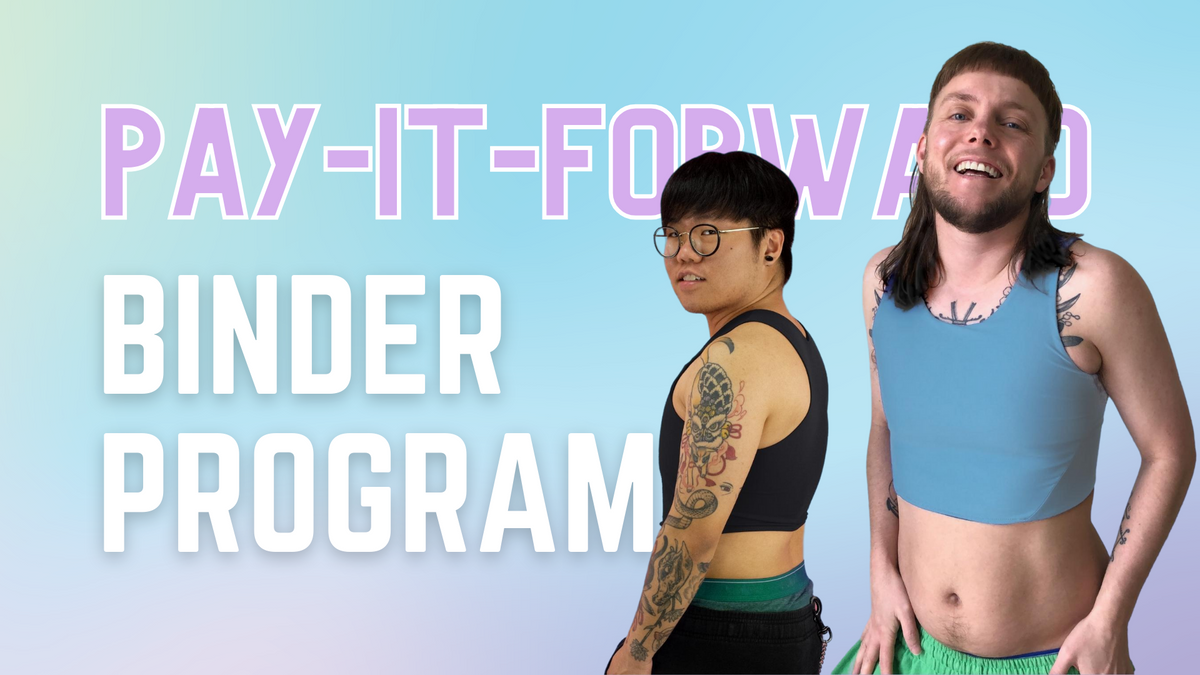
A new investigation by 4W revealed that TransFolk of WA, a registered Australian charity, is sending chest binders to girls without parental consent or medical oversight. “Chest binding” is the act of forcefully restricting breasts to flatten them as much as possible, and binders are targeted at females.
Pay-It-Forward binder program targets vulnerable girls
On April 6, TransFolk of WA announced on their Facebook page that they had mailed over 85 binders recently through their “Pay-it-Forward binder program.” The program distributes chest (breast) binders to “people that otherwise couldn’t afford a binder.”
TransFolk of WA is a registered Australian charity and Lotterywest grant recipient based in Western Australia. According to its website, the organization hosts online and in-person support groups for “trans women, trans men, non-binary folk, youth, parents of trans people and partners of trans people.”
Chest binding has “become a popular practice” to flatten your chest “to make it more male-presenting,” according to WebMD. This is common among girls and women who claim to “identify” as boys and men or, increasingly, “non-binary.” Sometimes, those using binders suffer from sex dysphoria, a mental illness that causes extreme discomfort or detachment from one’s body.
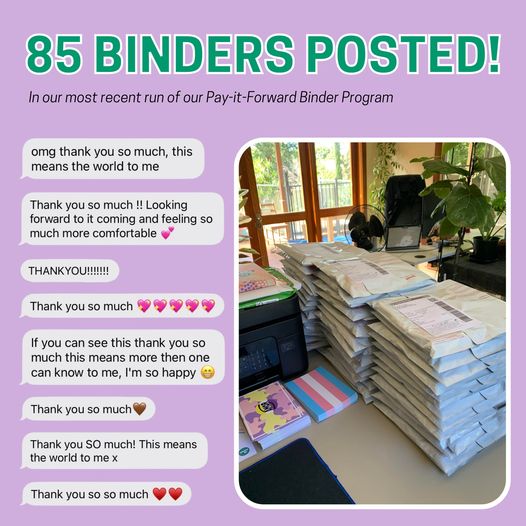
TransFolk of WA announced the Pay-it-Forward Binder Program in 2020. At the time, the program was covered by local LGBTQIA+ website OUTinPerth where TransFolk of WA Vice Chair Emery Wishart claimed that “Wearing a binder can be a source of gender euphoria; helping folks feel confident, at home and authentic.”
“Responsible binding is safe and an essential element [of] trans and gender diverse affirming health care,” said Wishart.
According to a program report from the TransFolk of WA website, 65 percent of participants in the binder program are minors (under 18). Over 85 percent said that they could not otherwise afford a binder. The program delivered binders to 136 people within a four-month period.
Forty percent of binder recipients who responded to the survey claimed that they live in an “unsafe home,” which, according to the report, is when the respondent “Didn't live in a home where they could have a binder posted to them” or where the respondent was “worried about family's reaction” to them using a binder. The report states that almost half of the respondents had a lack of knowledge about binders or where to get them. The results were based on a survey of 49 program participants.
Lack of safeguarding and medical oversight
Despite the fact that breast binding is a dangerous activity with serious potential health repercussions, the Pay-it-Forward binder program includes no safeguards.
The “Binder Program” page on the TransFolk of WA website does not include any information about the health risks of breast binding.
The binder program is open to people (girls) of “any age” and simply requires filling out a form.
The 17-question form never asks if applicants previously sought assistance through a medical or mental health professional. Likewise, the questionnaire never attempts to identify applicants who may have underlying physical conditions like asthma, scoliosis, or lupus — all of which carry additional risks when chest binding.
People experiencing COVID-19 respiratory symptoms have also been advised not to use a binder, but the form does not screen for COVID-19 symptoms or recent exposure. The form does not inform applicants that chest binding places them at a much higher risk of complications from COVID-19.
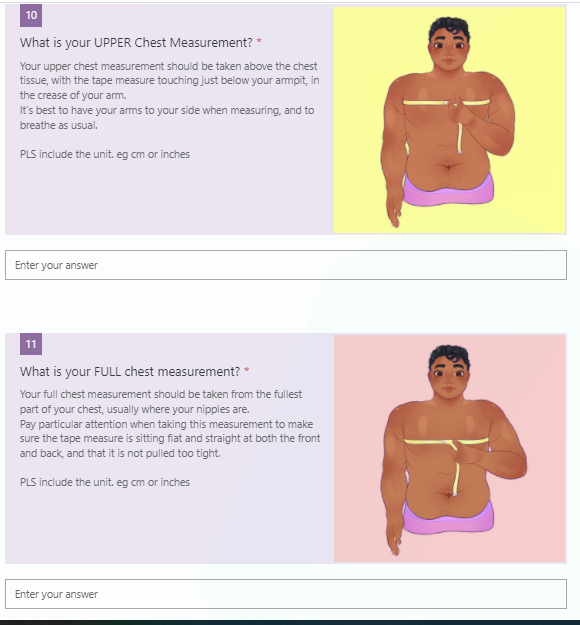
Although the form does ask for the applicant’s age, it does not require additional parent contact information or consent for minors. All applicants, including children, are asked to provide multiple contact methods, their home address, and the physical measurements of their breasts and chest area. Applicants are also informed they can use a name other than their legal name and opt to have the binder sent to an address other than their home.
I was able to obtain a binder from TransFolk of WA within five days of submitting the form, claiming to be a 14-year-old girl. The binder sent to me, per my honest measurements, was a size XXS. After taking one look at it I knew it was dangerously small for someone of my size to wear; in fact, it barely fit around my thigh, much less my upper body.
There were two small cards included with the binder. One of the cards (from TransFolk of WA) had a list of 10 "tips for being an ally to trans and gender diverse people" and the other was a card from AMOR, the brand name of the binder. This card had care instructions (warmer gentle machine wash with mild detergent etc.) along with a few “guidelines to wearing your AMOR binder” including AMOR's recommendation to not bind for more than 10 hours at a time. Neither of the two cards included with the binder had any information about mental health assistance nor did they mention speaking to parents or a trusted medical professional. The cards did not include any information about the more serious side effects that can result from wearing a binder.
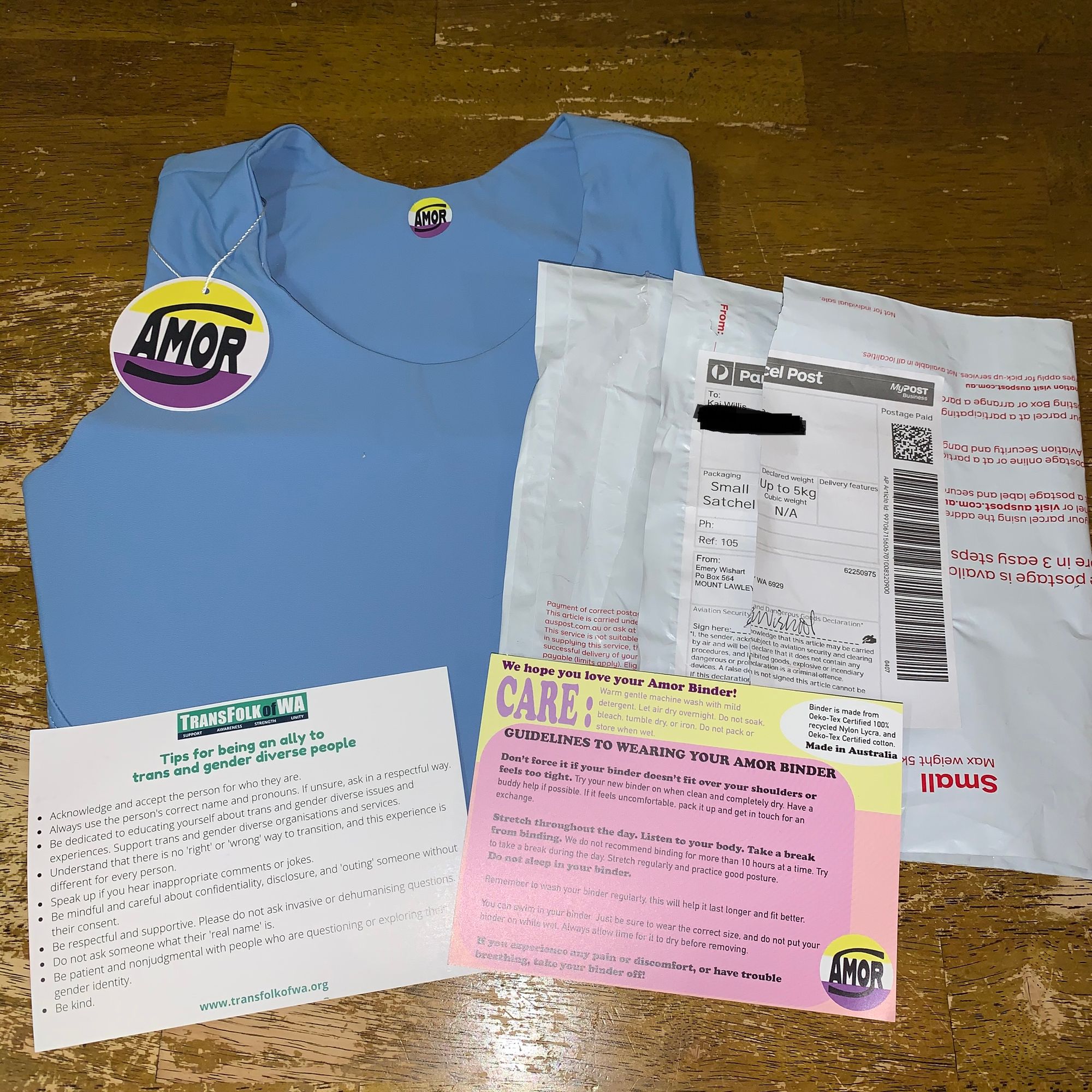
TransFolk of WA did not reply to request for comment.
Dangers of Breast Binding
The consequences of binding breasts vary and may be similar to those caused by the illegal and widely condemned practice of “breast ironing” (aka breast flattening). Breast binding has been found to cause severe damage to ribs, lungs and breasts and potentially harm a woman’s ability to breastfeed in the future. Chest restriction can exacerbate existing respiratory illness, and wearing a binder when sick can lead to a build-up of fluid in the lungs. Binding can lead to fractured ribs which puts wearers at a much higher risk of puncturing or collapsing a lung.
Despite these risks, chest binding is often promoted as a harmless practice due to not requiring invasive medical treatment or surgery. However, the research does not support claims that wearing a binder can be done safely and healthily.
In a 2016 cross-sectional study on the health impact of chest binding among transgender adults, researchers found that over 97 percent of participants reported at least one of 28 negative outcomes attributed to binding. The negative outcomes ranged from back, shoulder, and chest pain to respiratory and skin infections to breast, rib & spine changes. The method most associated with symptoms was compression with commercial binders. This evidence contradicts the recommendation to wear commercially purchased binders in order to avoid side effects.
4W provides paid writing work for over 50 women in countries spanning the globe. This work is made possible thanks to our paid monthly subscribers. Join today to support our work!
Enter your email below to sign in or become a 4W member and join the conversation.
(Already did this? Try refreshing the page!)



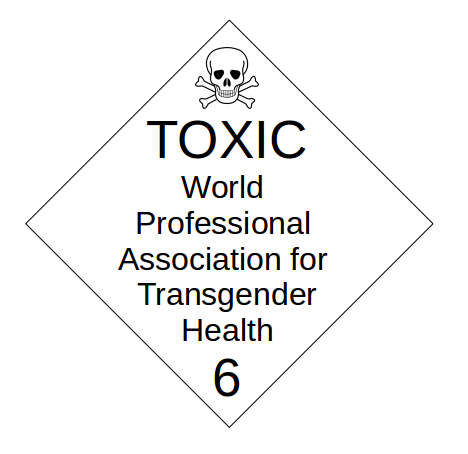
Comments